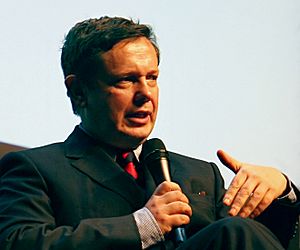Frank Schirrmacher facts for kids
Quick facts for kids
Frank Schirrmacher
|
|
|---|---|
 |
|
| Born | 5 September 1959 Wiesbaden, West Germany |
| Died | 12 June 2014 (aged 54) Frankfurt am Main, Germany |
| Occupation | Co-publisher of the FAZ |
| Alma mater | University of Siegen University of Heidelberg University of Cambridge |
Frank Schirrmacher (born September 5, 1959 – died June 12, 2014) was a German journalist and writer. He was also an expert in literature. From 1994, he became one of the main people in charge of a big German newspaper. This newspaper was called the Frankfurter Allgemeine Zeitung.
Contents
Early Life and Studies
Frank Schirrmacher studied several subjects at university. He went to universities in Heidelberg and Cambridge. He studied German, English, and philosophy. In 1985, he started working at the FAZ newspaper. He joined the team that worked on the arts and culture section.
In 1988, he earned his doctorate degree. This was for his work about the writer Franz Kafka. Later, there were some questions about his earlier academic writings. Some people said parts of his doctorate work were very similar to his earlier master's thesis.
Leading the FAZ Newspaper
In 1989, Frank Schirrmacher took over an important role. He became the director of the FAZ's arts and culture section. He took over from a famous critic named Marcel Reich-Ranicki.
By 1994, he became one of the five publishers of the newspaper. This meant he was one of the top leaders. He was in charge of the arts, science, and other parts of the newspaper. Under his leadership, the FAZ started to cover more topics. This included more science news and stories about popular culture.
Around the year 2000, newspapers were very popular. Schirrmacher made the arts section bigger. He hired many new journalists from other newspapers. However, a few years later, things changed. He had to make the arts section smaller. For the first time in the FAZ's history, he also had to let some employees go.
Important Public Discussions
Frank Schirrmacher often helped shape public talks in Germany. He discussed important and sometimes difficult topics. These included debates about genetic engineering and brain research. He also talked about the low birth rates in Germany and Europe. Newsweek magazine called him one of Germany's top thinkers. Another famous thinker, Ray Kurzweil, also called him a "big thinker."
The Martin Walser Book Controversy
In 2002, Frank Schirrmacher caused a big stir in the German press. This happened when he reviewed a novel by Martin Walser. The book was called Tod eines Kritikers (Death of a Critic). Schirrmacher said the book seemed to be about his former colleague, Marcel Reich-Ranicki. Reich-Ranicki was a German literature critic of Jewish background. Schirrmacher believed the book contained parts that were offensive and unfair to Jewish people.
He reviewed the book before it was even published. Because of his review, the publishers decided to change the novel. They changed it before it was printed and sold. This was the first time in German history that a book review had such a big effect.
Books on Society and Ageing
In 2004, Schirrmacher published a book called Das Methusalem-Komplott. This book was translated into 14 languages. It sold over one million copies in Germany. In it, he wrote about how society was getting older. This was because fewer babies were being born. He called for older people to speak up and make changes. He won the Goldene Feder award for this book.
In 2006, he published another bestseller called Minimum. The title referred to his idea that the family unit was becoming weaker. He thought this led to fewer social connections. To show how important families are, he mentioned the Donner Party. This was a group of pioneers who faced extreme hardship. Critics said he might have used statistics in an exaggerated way. They also said he supported a very traditional view of the family. His book caused another big media discussion about families.
Günter Grass's Revelation
In 2006, Frank Schirrmacher interviewed the Nobel Prize winner Günter Grass. During this interview, Grass admitted something surprising. He said that he had served in the Waffen-SS when he was young. The Waffen-SS was a combat force during World War II. Grass said he was drafted into it at age 17. This happened in the last months of the war.
This admission caused a huge worldwide discussion. It also made Grass's publisher release his new autobiography earlier than planned. The book was called Peeling the Onion.
Awards and Recognition
Frank Schirrmacher received many awards and honors. He won the International Corinne Book Prize. In 2007, he was given the "Kulturpreis Deutsche Sprache." This is one of the highest cultural awards in German-speaking countries.
Images for kids
 | Valerie Thomas |
 | Frederick McKinley Jones |
 | George Edward Alcorn Jr. |
 | Thomas Mensah |


